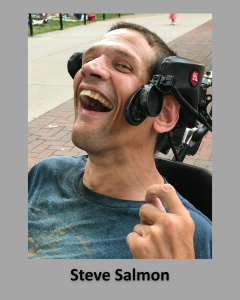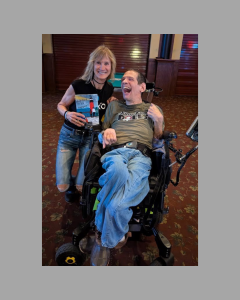
How Morse Code Allowed Steve Salmon, ’98 English, to Meet His Destiny As a Writer
Steven Salmon arrived at UWSP knowing he wanted to write. Because he had cerebral palsy, this dream wasn’t as simple as setting pen to paper. A history instructor at Madison College had suggested that Point might be a good place for him to explore writing as a vocation. He needed to learn how to write in the sense of crafting language to express his ideas, as all aspiring writers do, but even more importantly, he needed to find a logistical path to doing the work he knew he was destined for.
palsy, this dream wasn’t as simple as setting pen to paper. A history instructor at Madison College had suggested that Point might be a good place for him to explore writing as a vocation. He needed to learn how to write in the sense of crafting language to express his ideas, as all aspiring writers do, but even more importantly, he needed to find a logistical path to doing the work he knew he was destined for.
At the time, Stephen Odden was the English Department Chair, and he told his colleagues to treat Salmon as a regular student, which was a good call, given how determined he was to fulfill his lifelong dream, which he experienced powerfully as his destiny.
When the English Department realized they had an aspiring writer with cerebral palsy, the community welcomed him with open arms and, in a way, became co-conspirators in Salmon’s process. Steven became “Steve,” and he immediately met four classmates who would become lifelong friends, chosen family, who always believed in his seemingly impossible dream of becoming a published author. When his mother, his primary caretaker, died a decade ago, he says his friends “helped me grow up and become independent; they expected me to do this, and I did.” But the route was circuitous.
After high school graduation at 18, he had applied to the Department of Vocational Rehabilitation (DVR) but was labeled as “unemployable.” DVR assists the disabled with training, education, and specialized equipment like computers. He says, “I sat home for two years after I graduated from high school feeling angry, lonely, and determined to prove DVR wrong.” During his years at Point, he made his way into the world using a voice recognition computer, which, in the early days of this technology, was slow and tedious. Salmon says, “I spelled out each word, letter by letter, but it was better than dictating, which I did in high school. I was allowed to take my essay exams at home, but while I was allowed extra time to write tests, I never asked for extensions for my papers, always preferred to work ahead and meet my deadlines.”
Of the many UWSP professors who are part of Salmon’s story, he cites Richard Behm as teaching him how to write, novelist Larry Watson as helping him launch his first novel, and Donna Decker as teaching me how to critique and write poetry.
After graduating from Point, he published his first book with his mother as editor. He was writing daily and was a teaching assistant for several instructors at Madison College. An occupational therapist at the Waisman Center introduced him to Morse code as an input device, and he learned the skill in two weeks. It enabled him to edit, email, and use the Internet independently, which was a game-changer. Even more importantly, it allowed him to write more.
After his mother’s death, he had to handle his own affairs, including managing his considerable care needs, and Morse code gave him the key to his independence.
As he perseveres, he continues to stay the course of his destiny — being a writer by vocation — a path made possible by his time at Point. Check out his most recent novel, Why Did It Happen?, on his website.

